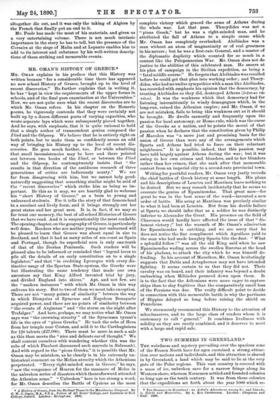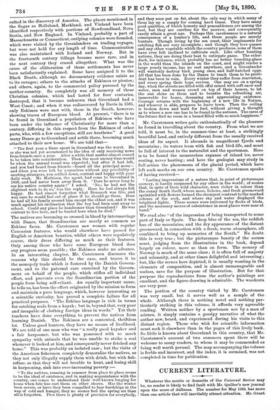TWO SUMMERS IN GREENLAND.* THE weirdness and mystery prevailing over
the spacious zone of the Frozen North have for ages exercised a strong attrac- tion over nations and individuals, and this attraction is shared in by Greenland, a land which may be said to lie at the very gate of the Polar regions. This vast country is covered with a mass of ice, unbroken save for a narrow fringe along its Western shore, whereon Norsemen settled and founded colonies so long ago as the tenth century. It was from these colonies that the expeditions set forth about the year 1000 which re-
• Two Summers in Greenland; en Artist's Adventures among 153 and Islands, in Fjords and Mountains. By A.. RIM Carsteusen. London: Chapman and Hall. 1890.
suited in the discovery of America. The places mentioned in the Sagas as Helluland, Markland, and Vinland have been identified respectively with portions of Newfoundland, Nova Scotia, and New England. In Vinland, probably a part of Massachusetts or Connecticut, outlying colonies were founded,
which were visited by the Greenlanders on trading voyages, but were not held for any length of time. Communication was also maintained with Iceland and Norway. But in the fourteenth century tidings became more rare, and in the next century they ceased altogether. What was the cause of the obliteration of these settlements has never been satisfactorily explained. Some have assigned it to the Black Death, although no documentary evidence exists as to its ravages ; others to the attacks of Eskimos or pirates ; and others, again, to the commercial policy pursued by the mother-country. So completely was all memory of these Christian colonies, which had lasted for four centuries, destroyed, that it became unknown that Greenland had a West Coast ; and when it was rediscovered by Davis in 1585, only Eskimos were met with, those in the South, however, showing traces of European blood. At present, "there is to be found in Greenland a population of Eskimos who have been under the influence of Christianity for more than a century, differing in this respect from the Eskimos of other parts, who, with a few exceptions, still are heathens." A good many Danes go to Greenland and settle there, becoming much attached to their new home. We are told that-
" The first year a Dane spent in Greenland was the worst. He or she was not yet accustomed to the idea of only receiving news from friends once a year. After a while that matter almost ceased to be taken into consideration. Then the most uneasy time would be when the annual vessel was expected ; but after it had left, and you had heard from friends—heard all the principal news— and when you were left by yourselves without any possibility of meeting strangers, you settled down, content and happy with your daily work. Mr. Mathisen, the agent, had come to Greenland in 1838, and had never been away from it. 'Does he never long to see his native country again ?' I asked. 'No; he had not the slightest wish to do so,' was the reply. Here he had always felt happy. He had almost forgotten what Denmark was like, and was sure he would feel out of place if he should go there. Here he had all his family around him except the eldest son, and it was much against his inclination that the boy had been sent away to school. Could any place be handsomer than Greenland? He was content to live here, and be buried here when he died."
The natives are becoming so crossed in blood by intermarriage with Danes, that Scandinavian are nearly as common as Eskimo faces. Mr. Carstensen saw women with regular Caucasian features, who would elsewhere have passed for English or American beauties, whilst others were repulsively coarse, their dress differing as much as their features. Only among those who have some European blood does any progress seem possible ; the Eskimos make no advance. In an interesting chapter, Mr. Carstensen discusses the reasons why this should be the case, and traces it to the monopoly trade which is fostered by the Danish Govern- ment, and to the paternal care exercised by the Govern- ment on behalf of the people, which stifles all individual effort, and prevents even the Scandinavian portion of the people from being self-reliant. An equally important cause, he tells us, has been the effort originated by the mission to form and maintain a pure language, which, however interesting as a scientific curiosity, has proved a complete failure for all practical purposes. "The Eskimo language is rich in terms for catching seals from a kayak ; but is, beyond that, very poor and incapable of clothing foreign ideas in words." Yet their teachers have done everything to prevent the natives from learning Danish. The Eskimos are a contented, thriftless lot. Unless good hunters, they have no means of livelihood. We are told of one man who was "a really good kayaker and a fair harpooner, but who was possessed with so much sympathy with animals that he was unable to strike a seal whenever it looked at him, and consequently never fetched any home." This was probably an isolated case ; but the visits of the American fishermen completely demoralise the natives, as they not only illegally supply them with drink, but with fish- refuse, so that they will not trouble to hunt, and losing skill in harpooning, sink into ever-increasing poverty :—
" To the natives, roaming in summer from place to place seems to be the ideal of existence, and in making acquaintance with the country, one comes to understand their well-known longing for home when fate has cast them on other shores. Has the winter been severe, or have they been compelled to face hardships in the way of cold and hunger, they no sooner feel the spring air than all is forgotten. Then there is plenty of provision for everybody, and they soon put on fat, about the only way in which many of them lay up a supply for coming hard times. They have many good qualities, of which honesty and peaceableness are among the best, but they are careless for the morrow, and consequently rarely attain a great age. Perhaps this carelessness is a natural consequence of a hunter's life, and those people are merely hunters. Though living by the sea coast, their implements for catching fish are very incomplete ; and though they love queues and any other vegetable which the country produces, none of them have ever felt inclined to cultivate such. Like other hunting nations, they are doing their best to extirpate game. The eider- duck, for instance, which probably has no better breeding-place in the world than the islands on the coast, and might render a large yearly income, has no rest anywhere, and a Greenlander will wantonly destroy bird, young ones, and half-hatched eggs. All that has been done by the Danes to teach them to be provi- dent has been in vain. Every winter they suffer from starvation, and every spring their hope revives. One may see on a spring day, when the streets are filled with offal mixed with soft snow and water, men and women crowd on top of their houses, to let the sun shine on them and to breathe the refreshing air, immovable for hours, dreaming and appreciating existence. Courage returns with the beginning of a new life in Nature, and whoever is able, prepares to leave town. Then the ceiling is broken down and used for fuel, without giving a thought as to where a new one has to be found in the autumn. The cases of the future find no room in a breast filled with so much happiness."
Mr. Carstensen writes quite enthusiastically of the pleasure he found in travelling about the country. From what we are told, it must be, in the summer-time at least, a strikingly beautiful land, and entirely different from the usually received ideas of its aspect. It abounds in magnificent fjords and mountains ; its waters teem with fish and bird-life, and must be full of interest to the naturalist and the sportsman. Here is to be found the measureless expanse of inland ice, never resting, never lasting; and here the geologist may study in full action the phenomena of the glacial period, which have left such marks on our own country. Mr. Carstensen speaks of having received-
" Lasting impressions of a nature that, in point of picturesque scenery, is hardly surpassed by any other in the world ; of scenes that, in spite of their wild character, were richer in colour than the sunny South itself, where moss, lichens, and fresh greensward sprinkled with flowers formed the strongest contrast to the marked colours of the rock, and where sky and water displayed the brightest lights. These scenes were enlivened by flocks of birds, and the necessary means of subsistence in most places were near at hand."
We read also "of the impression of being transported to some part of Italy or Spain. The deep blue of the sea, the reddish hue of the mountains, and the dry appearance of the distant greensward, in connection with a fresh, warm atmosphere, all
combined to bring up memories of the South." No doubt this is very true ; but the picturesque beauty of the scenes must, judging from the illustrations in the book, depend largely on colour, more so than on form. The scenery of Norway is much of the same class ; it is often full of majesty and solemnity, and at other times delightful and interesting ; but, like the scenes here depicted, it is usually wanting in the elements of composition, and is almost unmanageable and useless, save for the purpose of illustration. But for that purpose the reproductions from the author's paintings are excellent, and the figure-drawing is admirable. The woodcuts are very poor.
The portion of the country visited by Mr. Carstensen was very small, but it serves well as a sample of the whole. Although there is nothing novel and nothing par- ticularly striking in this volume, it affords very agreeable reading. Written neither by a sportsman nor by a man of science, it simply contains a gossipy narrative of what the author saw, heard, and experienced during his visits to this distant region. Those who wish for scientific information must seek it elsewhere than in the pages of this lively book.
So little is known about Greenland in this country, that Mr. Carstensen's account of two summers spent there will be welcome to many readers, to whom it may be commended as being well worth perusal. The map accompanying the volume is feeble and incorrect, and the index, it is surmised, was not completed in time for publication.



































 Previous page
Previous page